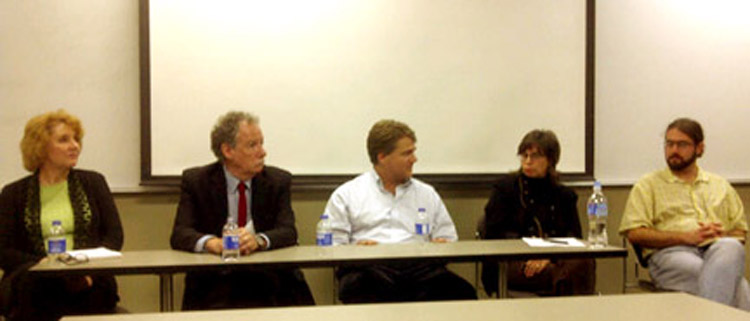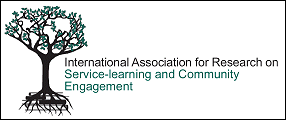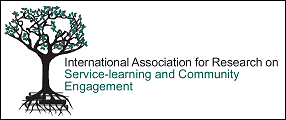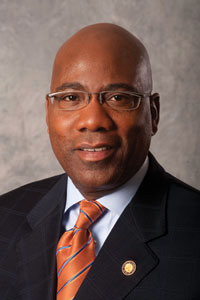SCOPE Second Workshop Draws Good Crowd Despite Stormy Weather
- March 23rd, 2011
- in News

Special to CCBP
Finding the right mentor can greatly improve a student’s or young faculty member’s chances of success. A student may need more than one mentor. The relationship should be reciprocal, with both sides benefiting. Undergraduates need encouragement to approach faculty for advice. The words “mentor” and “mentee” should be replaced with “better” words.
These were among many ideas floated at the second SCOPE (Scholars for Community, Outreach, Partnership, and Engagement) workshop of the semester held at 131 Lloyd Hall, Monday, February 28.
A major misunderstanding, said several on the panel and in the audience, was assuming that one’s program adviser is also one’s mentor. Those expecting that will likely be disappointed, after all an adviser may have dozens of advisees. He or she cannot have that many mentees (or trainees or protégés, other words suggested as substitutes for mentee).
Despite being under a thunderstorm alert, 20 faculty and students attended the workshop.
Workshop No. 3, covering the procedures for Institutional Review Board certification, will be held March 28 at the same time and place.
Here are some other ideas expressed at the meeting or e-mailed to the workshop organizers after the meeting.
“It seems there is a lack of understanding on the undergraduate level of what a mentor is in academia and how to go about getting one or several. I have heard many frustrations about advisers not giving individualized attention to students, and I think this stems from the actual differences between an adviser and mentor, but the perception from some students is that this person should play both roles. “” Elliot Knight
“I think finding a mentor should not be a casual, oh-it’ll-happen-thing. The student needing a mentor should take an activist position. Of course from the other side, I am often seeking mentees who are good at something I am not so good at. For example I was once up to date on SPSS, but no more”” too many changes since my grad school days. So I seek students who can bring me up to speed. Who, then, is the mentor and who is the mentee? “” Ed Mullins
“I thought that the workshop was interesting and helped to break down the barriers for students, especially undergraduates, who wished to approach faculty with ideas. While I thought that the panel represented an interesting mix of faculty and students who talked in general about mentoring, I felt that the accounts given tended to be vague and nonspecific. I believe a workshop such as that (which was really a panel presentation, though advertised as a “workshop”) would have benefited from hearing from those involved in a mentor/mentee “¦ relationship who could speak to the “here and now” of the situation, rather than recalling past relationships or speaking in vague terms.” [And on another issue] “Now that we have had good attendance at one workshop, it should be easier to get the word out for the next one. I would suggest, along with listservs, printed fliers and even “˜chalking the walk’ before the next workshop.” “” Jackie Brodsky
“One of the things that I found interesting enough that we should pursue it is making undergraduates feel comfortable approaching faculty with ideas and questions. Also, I was wondering if we should try to put together teams of two or three to attend faculty meetings in each college to explain who we are [SCOPE] and what our presence on campus means.” “” Maryann Whitaker
Other matters covered: mentoring can occur both inside and outside the institution; since mentoring is a two-way street, roles and responsibilities for each member should be identified; schedule regular meetings; assess your progress; be honest about what’s working and what isn’t; be candid if either member is not doing what’s needed or expected; examine the printed and online resources regarding mentoring.
If you have other thoughts about this workshop, the previous one (on writing successful conference proposals), or ideas to make the next one better, send an e-mail to any member of the steering committee: Jackie Brodsky, brods001@crimson.ua.edu; Gerald Franks, gerald.franks@ua.edu; Tiarney Ritchwood, tdritchwood@crimson.ua.edu; Maryann Whitaker, mswhitaker@crimson.ua.edu; Joshua White, jvwhite@crimson.ua.edu; Dr. Heather Pleasants, hpleasan@bamaed.ua.edu; Dr. George Daniels, gdaniels@ua.edu; Dr. Ed Mullins,emullins@bama.ua.edu.
Serving as moderators for the workshop were Dr. George Daniels and Dr. Heather Pleasants. Members of the panel were Maryann Whitaker, Elliot Knight, Lane McLelland, Dr. Danny Wallace, and Dr. Wilson Lowrey.


